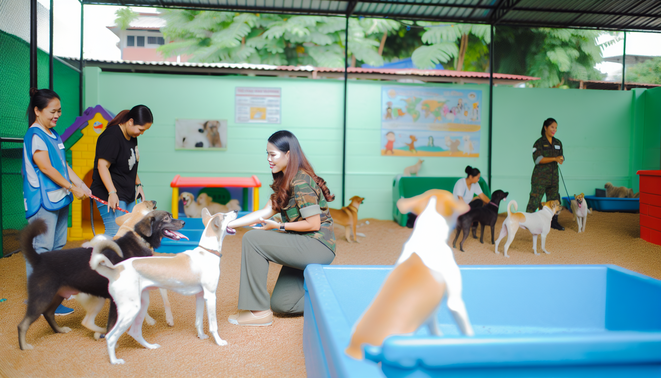“`html
General Shelter Information
When considering dog adoption, it’s essential to understand the role of shelters and rescues. Shelters provide a temporary home for dogs in need, often housing a variety of breeds and mixes. Most shelters conduct health screenings, behavioral assessments, and temperament testing to ensure the animals are suitable for adoption. This information is vital for prospective adopters to make informed decisions about which dog aligns best with their lifestyle.
Moreover, many shelters offer resources such as guidance on integration into a new home and ongoing support post-adoption. This ensures both the dog and the adopter have a successful transition, minimizing the chances of the dog being returned. For insights on how shelters operate and help dogs find forever homes, you can check out our article on volunteering in dog adoption.
Dog’s History and Behavior
The history and behavior of dogs play a crucial role in determining their fit for a new home. Understanding a dog’s past can shed light on its temperament, potential behavioral issues, and the needs associated with their previous experiences, whether from shelters, rescues, or previous owners. Historically, dogs were domesticated from wolves approximately 20,000 to 40,000 years ago, evolving alongside humans primarily as hunting companions and guardians. This long symbiotic relationship has fostered a range of breeds, each with distinct temperaments and behaviors that align with their historical purposes.
Adopting a dog requires insight into its background. For instance, dogs that have been mistreated may exhibit anxiety or distrust towards humans, necessitating a patient and understanding approach in their new environment. Conversely, dogs with stable and positive past experiences are often more adaptable and confident.
Behavioral assessments conducted by shelters can provide adopters with important information about a dog’s interactions with people and other animals, revealing tendencies such as playfulness or aggression. Factors like breed characteristics also influence behavior; for example, herding breeds tend to be more energetic and require more mental stimulation, while toy breeds may seek affection and companionship.
Prospective dog owners must communicate openly with shelter or rescue workers to gather as much information as possible about a dog’s history. This helps ensure a better match between the dog’s needs and the adopter’s lifestyle, leading to successful long-term companionship.
Health and Medical Concerns
Health and medical considerations are paramount when adopting a dog. Most reputable shelters provide initial health screenings which include vaccinations, spaying or neutering, and sometimes microchipping. It’s crucial for adopters to inquire about any existing health issues the dog may have, as some breeds are prone to specific medical conditions. Regular veterinary check-ups and preventative care contribute significantly to a dog’s quality of life and longevity.
Additionally, new owners should establish a relationship with a local veterinarian to ensure ongoing health monitoring and to address any concerns that may arise post-adoption. For detailed information on pet care, it’s beneficial to consult resources at your local veterinary clinics.
Training and Socialization
Training and socialization are essential for a well-adjusted dog. Shelters often provide preliminary training, teaching basic commands and socialization skills that help dogs adapt to their new environment. It’s important for adopters to continue training, as ongoing education strengthens the bond between dog and owner.
Social interaction with other dogs and people is crucial in developing a dog’s confidence and reducing anxiety. Group training classes or dog parks can be excellent opportunities for socialization post-adoption. For more training tips, consider visiting local training facilities or exploring online resources dedicated to dog training.
Lifestyle Fit
When adopting a dog, assessing your lifestyle fit is critical. Factors to consider include your daily schedule, living situation, and activity level. For example, active families may benefit from adopting a high-energy breed that enjoys playtime, while individuals seeking companionship might match better with a more laid-back dog. This consideration ensures that both the dog and adopter enjoy a harmonious relationship.
Open communication with the shelter can provide insights into which dogs may be the best fit based on your unique lifestyle. This transparency aids in creating a successful and long-term companionship. Evaluating lifestyle compatibility is also important when considering the needs for training and socialization to fit your routine.
Post-Adoption Support
Post-adoption support is invaluable for ensuring a successful transition for both the dog and the adopter. Many shelters offer resources such as training classes, behavior workshops, and access to support groups. These services can help resolve potential issues and provide ongoing education for new dog owners.
Engaging with fellow adopters can also create a community of support where experiences and tips can be shared freely. This network can be especially beneficial during the adjustment phase, aiding both the dog and owner in developing a deeper bond.
Conclusion
Adopting a dog is a profoundly rewarding experience that requires careful consideration and preparation. By understanding a dog’s history, health needs, training requirements, and lifestyle compatibility, adopters can foster a strong and lasting relationship with their new companion. Utilizing resources and support from shelters ensures that both dog and owner thrive in their shared journey. Remember, successful adoptions are built on education, communication, and love.
Sources
“`

4 thoughts on “Essential Questions To Ask A Shelter Before Adopting A Dog”